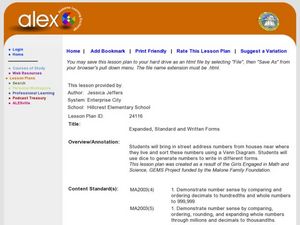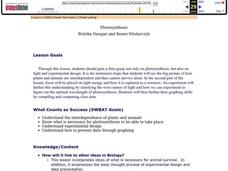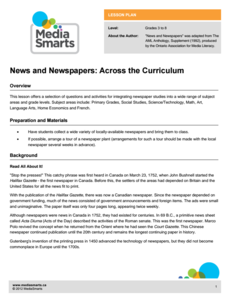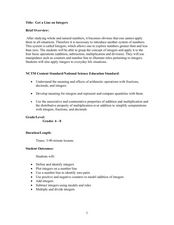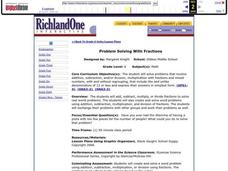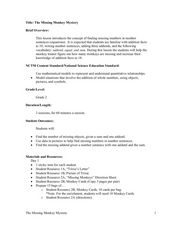Curated OER
Publishing With Photos!
Students create books with photographs as illustrations. In this book making lesson, students create books for different subjects to accompany what they are learning. They take photographs to match what they have written.
Curated OER
How High did My Rocket go?
Students shoot off a rocket and measure the trig ratios relation. In this geometry lesson, students practice using an inclinometer to figure out how high their rockets fly. They measure angles and height and relate it to gravity and...
Curated OER
Describing Nests
Students observe bird nests. In this observation level, students explore bird nests using their five senses. Students compare and contrast bird nests while hypothesizing about the need birds have to construct the nest.
Alabama Learning Exchange
Seeds: How They Grow
Students observe the growing stages of plants. In this plant growth lesson, students collect, germinate, and plant seeds to chart the growth process of plants.
Curated OER
Expanded, Standard and Written Forms
Students explore expanded, standard, and written forms of numbers. In this number sense lesson, students examine the various ways of writing numbers as they complete a Venn diagram activity.
Alabama Learning Exchange
I Scream for Ice Cream!
Students perform an experiment. In this combinations lesson, students complete an experiment where they find out how many ice cream cone combinations they can make with 5 different flavors of ice cream and 4 types of cones. They design a...
Curated OER
Those Cells Look Good Enough to Eat
Students explore the parts of the cell. In this cell lesson, students use foods to create cell models that represent the nucleus, cytoplasm, cell membrane, mitochondria, ribosomes, vacuoles, endoplasmic reticulum, and Golgi bodies...
Alabama Learning Exchange
Biomes
Students research different biomes and find its climate and what plants and animals that can be found in them. For this biomes lesson students search the Internet for their information and fill out a biome chart.
Curated OER
Photosynthesis
Students recognize the importance of plants as they perform an experiment involving photosynthesis. Students determine the optimum wavelength of light for photosynthesis by exposing plants to different colors of light, collecting data,...
Curated OER
Understanding Proportions and Scale Drawings
Proportions are ratios found using multiplication or division. Middle schoolers solve measurement problems, find a figure's missing dimension, and find the distance between two points. Resource features four lesson plans with detailed...
Curated OER
Guild Hall
Incorporate a research project into your study of Shakespeare and the Renaissance Period. Class members assume the role of an apprentice seeking membership in one of the various guilds that existed during the Renaissance period. After...
Curated OER
What is Physical Fitness?
First graders explore and discuss what physical fitness actually is, its benefits and how to obtain it through a variety of ways. They summarize the five parts of physical fitness: cardiovascular endurance,muscular strength, muscular...
Curated OER
Sequencing Events
Using The Very Hungry Caterpillar by Eric Carle, pupils practice sequencing events in a story. After reading the story, they head to the computer lab to use Kidspiration to sequence events. Then they create their own books to demonstrate...
Teach Engineering
Surface Tension Lab
What constitutes a good soap bubble? In the second installment of a nine-part series, scholars apply their understanding of surface tension to soap bubbles. They experiment to determine the best solutions to use for the...
Common Sense Media
The Masque of the Red Death
Poe goes high tech with a lesson that asks high schoolers to use the internet and various apps as they read and analyze "The Masque of the Red Death." In addition to responding to comprehension questions in Quizlet, they use Minecraft to...
Media Smarts
News and Newspapers: Across the Curriculum
Did you know that the Chinese Court Gazette is the longest continuing news paper in history? In addition to some great background information, this resource includes suggestions for activities across grade levels and across the curriculum.
Curated OER
The Nature of Mathematics
Young scholars work in groups to describe plants using numbers. For this number lesson, students use numbers to define plants and then use numbers to write descriptions of themselves.
Curated OER
Get a Line on Integers
Students explore number sense by completing math function problems in class. In this integers lesson, students define integers and practice plotting them on a number line. Students utilize math functions such as addition and...
Curated OER
Problem Solving With Fractions
Sixth graders solve and analyze fractions. In this algebra lesson, 6th graders solve fractions using addition, subtraction, multiplication and division. They work in groups and do peer-review.
Curated OER
The Distributive Property
Learners review how to solve problems using the Distributive Property of Mathematics. They solve problems using the paper and pencil method and then use the graphing calculator to discover the property over addition while making a visual...
Curated OER
The Missing Monkey Mystery
Second graders explore number values by completing number sentences. In this math functions lesson, 2nd graders identify whole numbers by using a visual aide and practice filling in the blank in number sentences. Students utilize their...
Curated OER
My Family and Me: Our Similarities and Differences
Young scholars are introduced to basic genetic information to discover how they acquired the traits they have. Individually, they develop a family tree and identify the similarities and differences between two poeple. In groups, they...
Curated OER
Unit 2 Sun & Stars
Young scholars describe stellar objects using terms such as stars, planets, satellites, orbits and light. In this sun and stars unit, students research stellar objects through seven individual lessons discovering star characteristics,...
Curated OER
From Where to Where?
Students find locations based upon their latitude and longitude coordinates. In this latitude and longitude lesson, students locate points on a grid and learn how to use an astrolabe.






